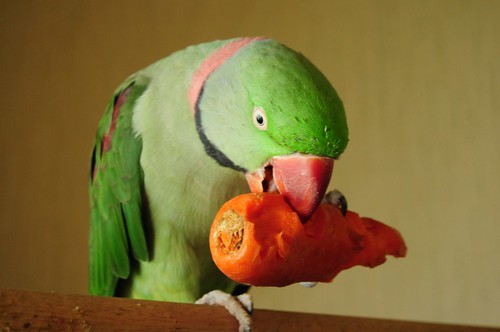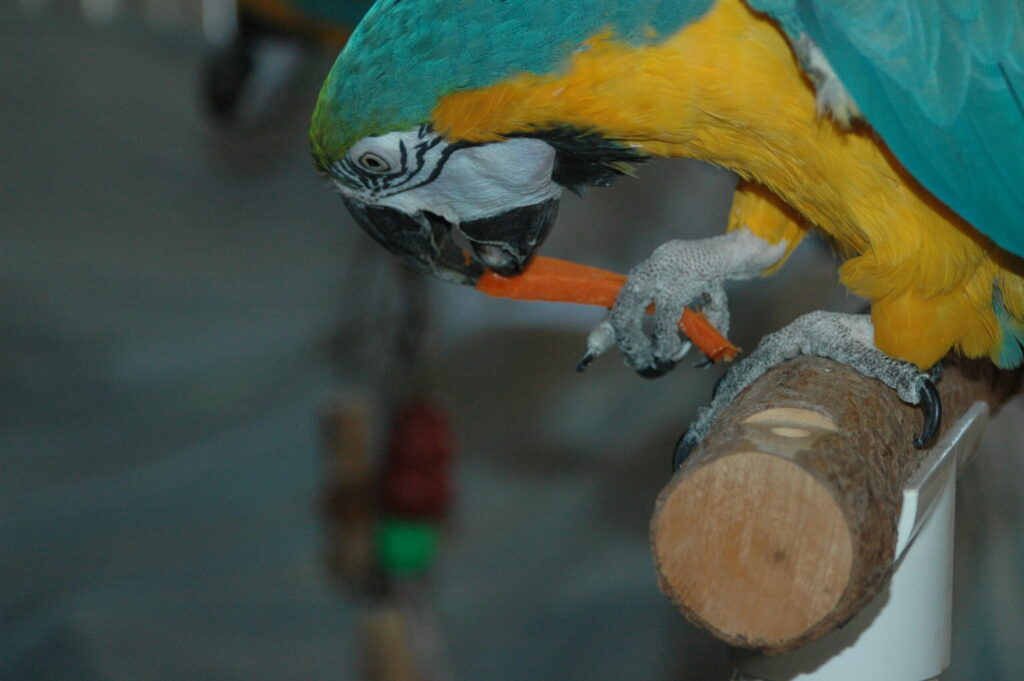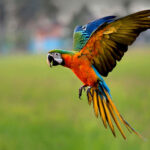Yes, parrots can eat carrots. Carrots are safe and healthy for parrots.
Carrots offer a nutritious snack for parrots, providing essential vitamins and minerals. Rich in beta-carotene, carrots promote good vision and a robust immune system. Their crunchy texture helps maintain a parrot’s beak health and provides mental stimulation. To serve carrots, you can chop them into small pieces or offer them whole for larger parrot species.
Ensure carrots are fresh and washed thoroughly to remove any pesticides. Including carrots in your parrot’s diet can contribute to a balanced and varied nutritional regimen. Always observe your parrot for any adverse reactions when introducing new foods. Carrots can be a delightful and beneficial treat for your feathered friend.
Introduction To Parrots And Carrots
Parrots are charming birds with vibrant colors and playful personalities. Pet owners often wonder about their diet. One common question is, can parrots eat carrots? Let’s explore this topic in detail.
Parrots love colorful and nutritious foods. Carrots are a common vegetable in many households. They are bright, crunchy, and full of nutrients. But are they safe for parrots to eat? Understanding the dietary needs of parrots will help answer this question.
Parrot Dietary Needs
Parrots need a balanced diet to stay healthy. Their diet should include:
- Fresh fruits
- Vegetables
- Nuts
- Seeds
Each parrot species may have different dietary requirements. A diet rich in vitamins and minerals is crucial. It’s important to offer a variety of foods to meet their nutritional needs.
Common Foods For Parrots
Many foods are safe and healthy for parrots. Common foods include:
| Food Type | Examples |
|---|---|
| Fruits | Apples, Bananas, Berries |
| Vegetables | Carrots, Spinach, Broccoli |
| Nuts | Almonds, Walnuts |
| Seeds | Sunflower, Pumpkin |
Carrots fall under the vegetable category. They are safe for parrots to eat. Carrots provide essential vitamins like Vitamin A. They are also crunchy, which parrots enjoy.
Feeding carrots to parrots can be beneficial. Always ensure they are washed and cut into small pieces. This prevents choking and makes it easier for the parrot to eat.

Credit: www.quora.com
Nutritional Profile Of Carrots
Carrots are not only tasty but also packed with nutrients. They offer a variety of vitamins, minerals, and antioxidants. These nutrients are essential for your parrot’s health.
Vitamins In Carrots
Carrots are a rich source of vitamins. Some of the key vitamins include:
- Vitamin A: Essential for eye health and immune function.
- Vitamin K: Important for blood clotting and bone health.
- Vitamin C: Boosts the immune system and improves skin health.
Minerals And Antioxidants
Carrots also contain essential minerals and antioxidants. These include:
| Mineral/Antioxidant | Benefit |
|---|---|
| Potassium | Regulates fluid balance and muscle contractions. |
| Calcium | Essential for bone health and muscle function. |
| Beta-Carotene | Converts to Vitamin A, supports vision and skin health. |
| Antioxidants | Protect cells from damage and reduce inflammation. |
Including carrots in your parrot’s diet ensures they receive these vital nutrients. This supports their overall health and well-being.
Health Benefits For Parrots
Carrots are not only delicious but also packed with nutrients. These nutrients provide significant health benefits for parrots. Let’s explore how carrots can improve your parrot’s health.
Improved Vision
Carrots are rich in beta-carotene, which converts to vitamin A. Vitamin A is crucial for maintaining good vision. This nutrient helps prevent eye infections and dryness. It also promotes healthy retinal function.
Enhanced Immune System
Vitamin A in carrots boosts the immune system. A strong immune system helps parrots fight off infections. Carrots also contain antioxidants, which protect cells from damage. This makes your parrot less susceptible to diseases.
| Health Benefit | Nutrient | Function |
|---|---|---|
| Improved Vision | Beta-carotene | Converts to Vitamin A, supports eye health |
| Enhanced Immune System | Vitamin A | Boosts immunity, fights infections |
Feeding carrots to your parrot can bring numerous health benefits. Always ensure the carrots are fresh and clean. Chop them into small pieces to make them easier to eat. Your feathered friend will thank you for the nutritious treat!
Potential Risks
Parrots love to eat carrots. But there are some risks to consider. Feeding carrots in moderation is important. Overfeeding and allergies are two main concerns.
Overfeeding Concerns
Giving too many carrots can harm your parrot. Carrots are high in sugar. This can lead to obesity in parrots. Parrots need a balanced diet for good health.
| Nutrient | Amount in 100g of Carrots |
|---|---|
| Sugar | 4.7g |
| Fiber | 2.8g |
| Vitamin A | 835μg |
Too much sugar can cause health problems. Obesity can lead to heart issues and diabetes. Balance carrots with other vegetables. This ensures your parrot stays healthy.
Possible Allergies
Some parrots might be allergic to carrots. Watch for signs of allergies. Common signs include:
- Sneezing
- Swelling
- Skin rashes
- Breathing problems
If your parrot shows these signs, stop feeding carrots. Consult a vet immediately. Allergies can be serious. Always introduce new foods slowly.
How To Serve Carrots
Parrots love to eat a variety of foods. Carrots are one of the healthiest options for them. But how should you serve carrots to your parrot? Let’s explore the best ways to serve carrots.
Raw Vs Cooked
Both raw and cooked carrots are safe for parrots. Raw carrots are crunchy and fun for parrots to chew. They also retain more nutrients. Cooked carrots are softer and easier to digest. Cooking can make some nutrients more accessible.
When serving raw carrots, wash them well. Remove any pesticides or dirt. Cut them into small, bite-sized pieces. This prevents choking.
For cooked carrots, steam or boil them. Avoid adding any seasonings or oils. Let the carrots cool before serving. Warm or hot food can harm your parrot.
Serving Sizes
Carrots should only be a part of your parrot’s diet. Balance is key.
Here’s a simple table to guide you:
| Parrot Size | Daily Carrot Serving |
|---|---|
| Small (Budgies, Lovebirds) | 1-2 small slices |
| Medium (Conures, Cockatiels) | 2-3 small slices |
| Large (Macaws, African Greys) | 3-4 small slices |
Monitor your parrot’s reaction to new foods. Start with small amounts. Gradually increase the serving size if they enjoy the carrots.
Too many carrots can upset their stomach. Keep an eye on their behavior and droppings. Adjust the serving size if needed.
Serving carrots correctly ensures your parrot gets the most benefit. Follow these tips for happy and healthy birds.
Alternative Vegetables
Parrots love to munch on carrots, but they also enjoy other vegetables. Exploring alternative vegetables can provide a balanced diet. Let’s dive into some healthy options for your feathered friends.
Leafy Greens
Leafy greens are a favorite among parrots. They are rich in vitamins and minerals.
- Kale – High in calcium and vitamin K.
- Spinach – Packed with iron and vitamin A.
- Swiss Chard – Offers a good amount of antioxidants.
Include a mix of these leafy greens in their diet. Rotate them to keep your parrot excited and healthy.
Other Root Vegetables
Root vegetables are another great option. They are nutritious and tasty for parrots.
- Sweet Potatoes – Rich in beta-carotene and fiber.
- Beets – Full of vitamins and minerals.
- Turnips – Good source of vitamin C and calcium.
Chop these root vegetables into small pieces. This makes it easier for your parrot to eat.
Mix different veggies to create a colorful and healthy meal for your parrot.
Table of Nutrients in Vegetables:
| Vegetable | Key Nutrients |
|---|---|
| Kale | Calcium, Vitamin K |
| Spinach | Iron, Vitamin A |
| Swiss Chard | Antioxidants |
| Sweet Potatoes | Beta-carotene, Fiber |
| Beets | Vitamins, Minerals |
| Turnips | Vitamin C, Calcium |
Tips For A Balanced Diet
Parrots need a balanced diet to stay healthy and happy. Carrots can be a part of this diet. Here are some tips to ensure your parrot gets all the nutrients they need.
Variety In Diet
Parrots thrive on a variety of foods. A diverse diet ensures they get all the necessary vitamins and minerals. Include fresh fruits, vegetables, seeds, and pellets.
- Fruits: Apples, bananas, and berries are great options.
- Vegetables: Carrots, broccoli, and spinach are healthy choices.
- Seeds and Nuts: Sunflower seeds and almonds can be included.
- Pellets: Choose high-quality pellets for balanced nutrition.
Monitoring Parrot Health
Keep an eye on your parrot’s health. Regular check-ups with a vet are essential. Monitor their weight and behavior for any changes.
| Health Aspect | Signs to Watch For |
|---|---|
| Weight | Sudden loss or gain |
| Feathers | Feather loss or dullness |
| Behavior | Lethargy or aggression |
If you notice any issues, consult your vet immediately. A balanced diet and regular monitoring keep your parrot healthy.

Credit: birdtricksstore.com

Credit: www.quora.com
Conclusion
Parrots can safely eat carrots. This nutritious vegetable offers numerous health benefits for your feathered friend. Always serve carrots in moderation. Ensure they are fresh and clean. Including carrots in your parrot’s diet can enhance their overall well-being. So, treat your parrot to this crunchy, healthy snack today!
Ryan Everhart is a passionate bird enthusiast and blogger, primarily writing on his website, Avian Whispers. His journey into the world of bird blogging began with a deep interest in parrots, a species that captivated his attention for their intelligence and social behavior. Over time, his content expanded to cover a broader range of bird species, offering insights into bird behavior, care, habitats, and conservation.
Ryan is dedicated to educating his audience, which includes both new bird owners and seasoned enthusiasts. His writing is filled with personal experiences, expert knowledge, and practical advice on bird care. Through Avian Whispers, he aims to foster a deeper appreciation for birds, emphasizing their role in nature and the joys of having them as pets.
Starting with articles focused on parrots, Ryan’s work now encompasses a diverse range of topics such as feeding, training, habitat enrichment, and bird health. His love for birds extends beyond parrots, diving into various avian species. His informative and heartfelt writing reflects his commitment to the well-being of birds and the desire to help others connect with these creatures.
As a growing voice in the bird blogging community, Ryan strives to provide a platform where bird lovers can learn, share experiences, and connect over a shared passion for avian life. His blogs are not only educational but also serve as a reminder of the importance of protecting and nurturing the bond between humans and birds.




